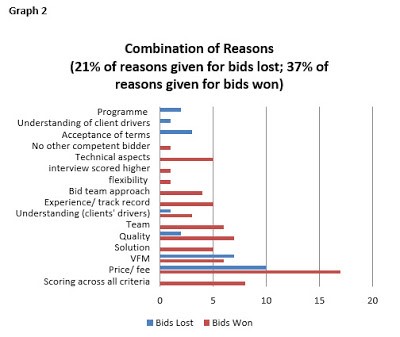When in 2014 MarketingWorks, in association with Professor Will Hughes of the University of Reading, updated their 2003 research assessing how the bid cost investment affects work winning within the construction industry, we found that differing behaviours and approaches influenced whether a company wins or loses the bid. So, as different behaviours may result in different outcomes for different kinds of project, it is vital to create and manage the bid process to capture good feedback, learn from past mistakes and apply the knowledge gained to maximise success in future bids.
In the survey, we asked ‘What reasons were given as to why you won or lost the bid?’ As this was an open question, we took the reasons given and grouped them under broader headings (Graph 1) and where a combination of factors was given, we then analysed them further in Graph 2 (below).
Comparative reasons given for bids won and lost
The survey found that for 11% of bids won and 15% of bids lost, the reasons for winning or losing are apparently unknown (See Graph 1 above). It is our experience that, without a clear, fact-based understanding of why bids succeed or fail, companies cannot make improvements for the future. Losing bidders may repeat mistakes and may be bidding for projects they could never win. Winning bidders may not be proactively applying the factors that have in the past led to success.
Long-standing government guidance advises governmental bodies to provide feedback to both winning and losing bidders as a matter of good practice. Anecdotal examples from the industry suggest that in some cases clients do not provide clear and accurate feedback whilst in others the bidders fail to ask. This leads to the conclusion that the industry as a whole (both sides of the work-winning process) are not valuing the role that feedback plays in improving the efficiency of work-winning approaches and behaviours.
Half of reasons given for losing the bids in this survey were price related (Graph 1). In practise, the suggestion is that price is often a default position: if all bidders are aiming to win on price or are differentiating in similar ways, then clients will revert to price as the most clearly defined way of choosing the winning bid. This result could also imply that these bids were lost because the bidders’ focus was purely on price.
Whilst there were other single, overriding reasons given for losing, it was extremely interesting that 21% of responses identified a combination of factors. The picture is quite different when reviewing the reasons given for winning. Here, whereas single, overriding factors were also mentioned, with almost a third of responses being price related, in almost 40% of responses, a combination of factors were given as the reason for winning.
We have broken down the responses mentioned within the category ‘combination of factors’ in Graph 2, to see the frequency with which different factors are mentioned. When we drill down into the combination of factors we can see that whilst price was mentioned in 25% of cases for winning bids and 27% for losing bids, many other reasons were also given.
The important thing to take away is that contractors and consultants shouldn’t try to win on one single thing, but that a better winning strategy would be to focus on a combination of winning factors, which requires an empowered and enthused team focused on understanding their clients’ needs and objectives and developing the right combination of key themes that will be successful for that client and project. This will not only significantly improve win rates, but reduce the number of abortive bids and their associated costs.
This blog is the eighth in a series prepared by members of the Constructing Excellence Procurement Theme Group to provoke debate and seek to provide thought leadership on a crucial aspect which we see as a major barrier to improving the productivity of the sector. Comments are welcomed on the Constructing Excellence LinkedIn page or on Twitter using the hashtag #CEProcurement.
Sign up below to get the next instalment of this series emailed to you directly:
[wysija_form id=”2″]



